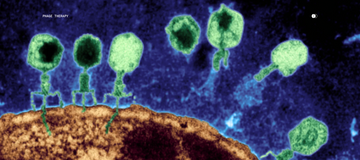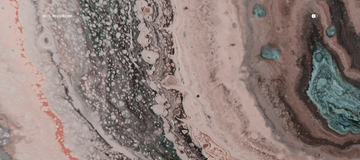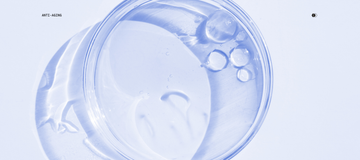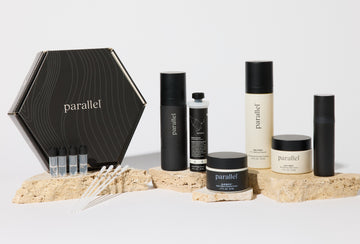Phage Therapy for Skin Health: The Future of Precision Skincare
by Parallel Health Team
What is Phage Therapy?
Phage therapy represents a revolutionary approach to engineering the microbiome and/or treating bacterial infections using bacteriophages—naturally occurring nano-microbes that specifically target and destroy harmful bacteria. In certain depictions, bacteriophages look like tiny futuristic AI robots, but in fact, they are one of nature's most powerful tools that have existed since bacteria have existed. Unlike broad-spectrum antibiotics that eliminate both good and bad bacteria, phages act like precision-guided missiles, selectively eliminating only the problematic microorganisms while preserving beneficial bacteria essential for skin health.
Originally discovered in the early 1900s in France and England independently, phage therapy is experiencing a renaissance as antibiotic resistance becomes a growing global health concern. Today, cutting-edge biotechnology is bringing this precise treatment modality to consumer skincare for the first time.
How Phage Therapy Works on Skin
The Science of Selective Targeting
Bacteriophages operate through a highly specific lock-and-key mechanism:
- Recognition: Each phage recognizes specific bacterial surface proteins
- Attachment: The phage binds only to its target bacterial species
- Injection: The phage inserts their DNA into the bacterial cell
- Replication: The phage reproduces inside the harmful bacteria
- Lysis: The bacterial cell bursts, releasing new phages to continue the process
This precision targeting means beneficial skin bacteria remain completely unharmed, maintaining the delicate balance of your skin's microbiome.
Why Traditional Antibiotics Fall Short
Broad-Spectrum Destruction: Topical antibiotics eliminate both pathogenic and beneficial bacteria, often causing:
- Microbiome imbalance and dysbiosis
- Increased susceptibility to harmful bacteria
- Antibiotic resistance development
- Skin barrier dysfunction
- Rebound bacterial overgrowth
Limited Effectiveness: Many conditions and infections, including acne, involve biofilm-forming bacteria that antibiotics struggle to penetrate effectively.
Clinical Applications of Phage Therapy
Acne Treatment Revolution
Research demonstrates phage therapy's remarkable effectiveness against Cutibacterium acnes, the primary bacteria associated with inflammatory acne¹:
- 99.9% reduction in acne-causing bacteria in clinical studies²
- No side effects such as dryness, irritation, or resistance development
- Selective action preserving beneficial C. acnes strains³
- Long-term efficacy without bacterial resistance concerns
Beyond Acne: Expanding Applications
Emerging research shows phage therapy potential for:
- Eczema and dermatitis caused by Staphylococcus aureus
- Rosacea linked to bacterial imbalances
- Chronic skin infections resistant to traditional treatments
- Post-procedure care preventing bacterial complications
- Anti-aging applications targeting inflammation-causing bacteria
Advantages Over Conventional Treatments
Superior Safety Profile
- Natural Origin: Phages exist naturally in the environment and human body
- Species-Specific: No off-target effects on human cells or beneficial bacteria
- Self-Limiting: Phages naturally disappear when target bacteria are eliminated
- No Systemic Absorption: Topical application remains localized to treatment area
Enhanced Effectiveness
- Biofilm Penetration: Phages can penetrate bacterial biofilms that protect harmful bacteria
- Adaptive Response: Some phages can evolve alongside bacteria, preventing resistance
- Rapid Action: Results often visible within 24-48 hours of treatment
- Complementary Therapy: Works synergistically with other skincare treatments
The Future of Personalized Skin Health
Precision Medicine Approach
Advanced phage therapy requires understanding your unique skin microbiome composition – that is, phages are extremely precise, so it is vital to understand what bacterial strain (or group of strains) is causing the issue. Whole genome sequencing reveals:
- Specific bacterial strains present on your skin
- Pathogenic vs. beneficial bacterial ratios
- Optimal phage cocktails for your microbial profile
- Personalized treatment protocols
AI-Driven Customization
Machine learning algorithms analyze vast microbiome datasets to:
- Predict treatment outcomes
- Optimize phage combinations
- Monitor treatment progress
- Adjust protocols based on skin response
Implementation and Considerations
Professional Guidance
While phage therapy shows exceptional promise, proper implementation requires:
- Microbiome testing to identify target bacteria
- Custom formulation based on individual bacterial profiles
- Professional oversight to monitor treatment progress
- Quality assurance ensuring phage viability and purity
Integration with Skincare Routines
Phage therapy integrates seamlessly with:
- Gentle, microbiome-friendly cleansers
- Barrier-supporting moisturizers
- Antioxidant serums and treatments
- Sun protection protocols
Research and Development Outlook
Clinical Validation
Multiple clinical trials are currently investigating phage therapy for various skin conditions, with promising preliminary results showing⁴:
- Significant improvement in inflammatory markers
- Restoration of healthy microbiome diversity
- Enhanced skin barrier function
- Improved patient satisfaction scores
Regulatory Landscape
As phage therapy gains recognition, regulatory frameworks are evolving to support safe, effective topical applications for cosmetic and therapeutic uses.
Frequently Asked Questions
Q: Is phage therapy safe for sensitive skin? A: Yes, phages are naturally occurring and highly specific, making them suitable for even the most sensitive skin types. Phages already exist in and on your body, so humans have evolved to live safely alongside them.
Q: How quickly can I expect results? A: When precisely matched, many users report improvements within 24-48 hours, with optimal results achieved over a few months. Severe or chronic cases may take up to one year with consistent use to experience the results they desire. Many patients benefit from continued testing and optimized phage for not only treatment, but also prevention.
Q: Can phage therapy be used long-term? A: Unlike antibiotics, phages don't cause resistance or tolerance, making them suitable for extended use when appropriate.
Takeaway
Phage therapy represents the convergence of cutting-edge biotechnology and precision medicine, offering a safe, effective alternative to traditional bacterial treatments. As we move toward an era of personalized skincare, phage therapy stands at the forefront of this revolution, promising targeted solutions that work with your skin's natural ecosystem rather than against it.
References
-
Marinelli LJ, Fitz-Gibbon S, Hayes C, et al. Propionibacterium acnes bacteriophages display limited genetic diversity and broad killing activity against bacterial skin isolates. mBio. 2012;3(5):e00279-12.
-
Golembo M, Belmaker A, Tross R, et al. Development of a topical bacteriophage gel targeting Cutibacterium acnes for acne prone skin and results of a phase 1 cosmetic randomized clinical trial. Skin Health Dis. 2022;2(3):e93.
-
Alves DR, Gaudion A, Bean JE, et al. Combined use of bacteriophage K and a novel bacteriophage to reduce Staphylococcus aureus biofilm formation. Appl Environ Microbiol. 2014;80(21):6694-703.
-
Latz S, Wahida A, Arif A, et al. Topical phage therapy in a mouse model of Cutibacterium acnes-induced acne-like lesions. Nat Commun. 2023;14:1397.



























